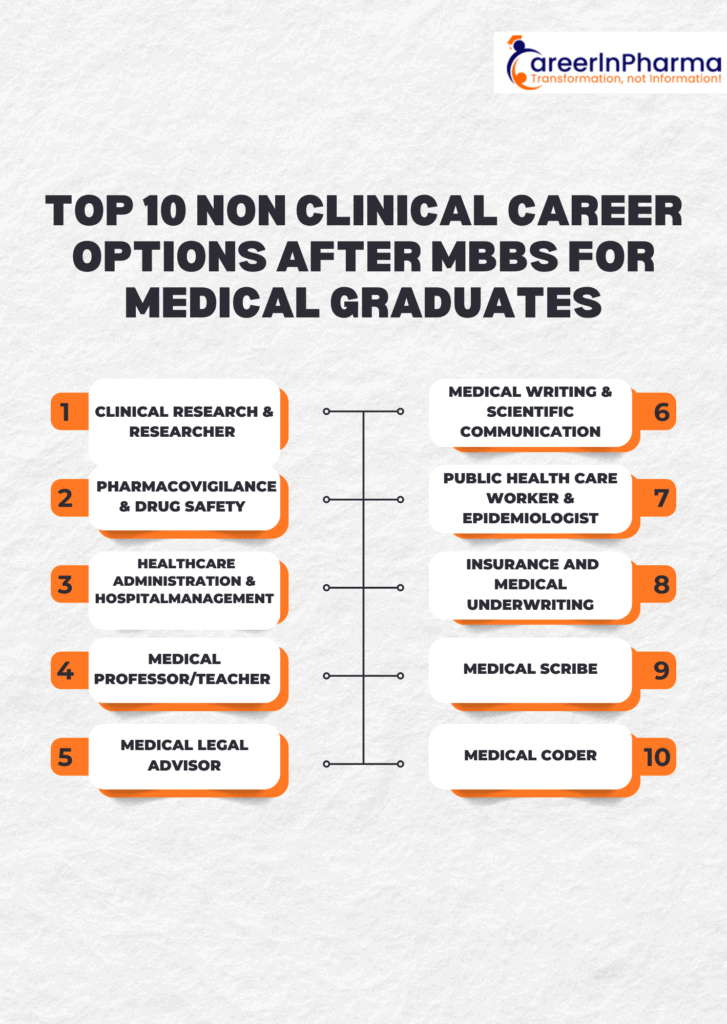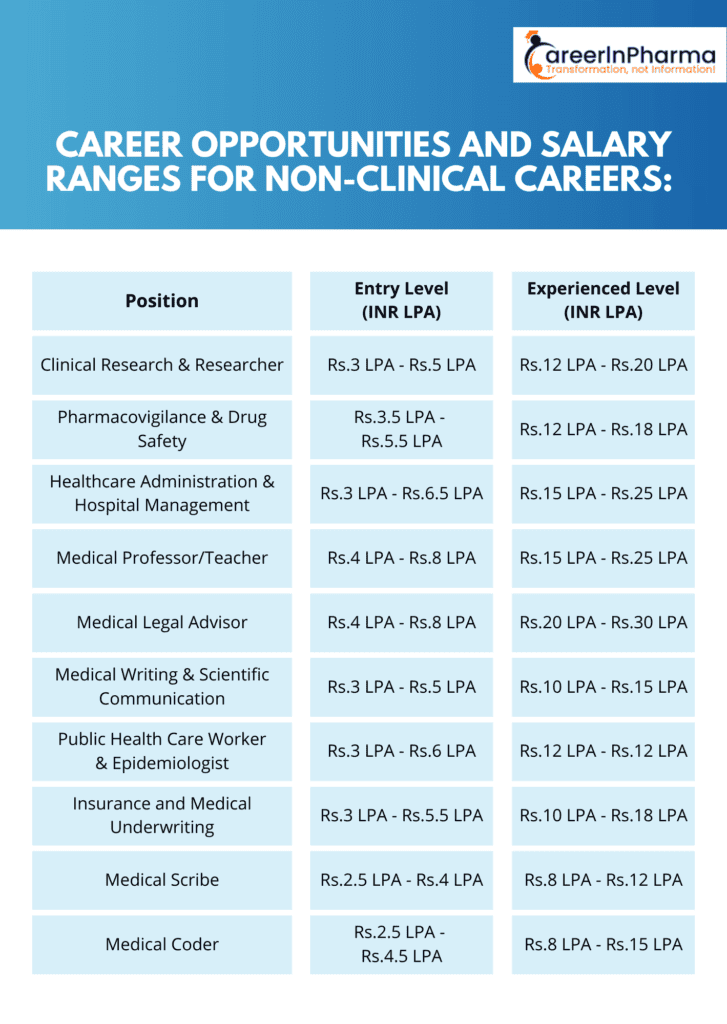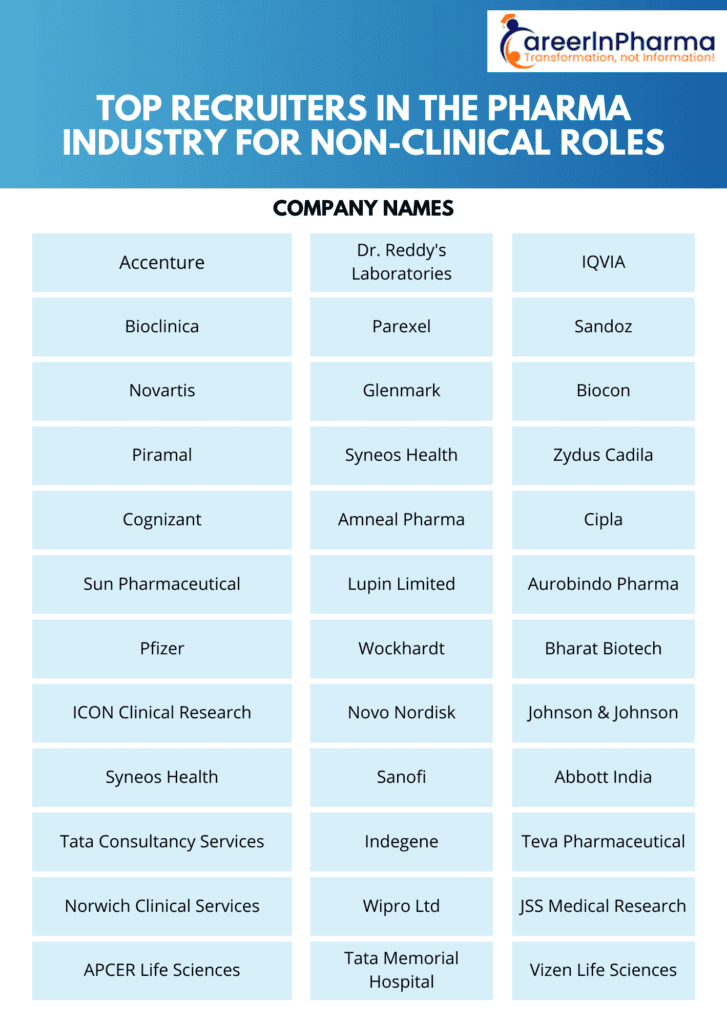
Every year, an abundance of MBBS (Bachelor of Medicine, Bachelor of Surgery) students graduate and join clinical practice, encountering numerous challenges. Some are unemployed and unable to succeed in their chosen route, while some take normal clinical courses or continue further studies abroad, others go into alternative occupations that match their interests and goals. Beyond clinical work, many doctors wonder, “What to do after MBBS?” Fortunately, other non-clinical job alternatives offer beneficial advantages like higher earnings, more work-life balance, and increased industry respect after completing the MBBS Degree.
In this blog, we’ll look at some unique but achieving work opportunities outside of clinical practice, allowing MBBS graduates to make smart choices. Whether you’re searching for a change of pace or a fresh start, CareerInPharma helps you find your ideal career fit. Our goal is to highlight numerous possibilities and remind people that exploring different paths is a natural aspect of career growth and development after MBBS.
Clinical Career Options After MBBS:
Higher Education in Medicine:
Your career can be advanced by specializing with an MS, MD, or diploma in a variety of medical fields. This is the best course of action if you have a strong interest in a certain field after completing an MBBS degree.
Private Practice:
If you are wondering what to do after your MBBS degree, one of the most common dreams for everyone is to open their private clinic. In addition to expanding your patient base and promoting your clinic, developing a reputation takes time and a large financial commitment. The return on investment, however, fluctuates according to several factors.
Multispecialty or Cooperative Practice:
Joining an organization of hospitals or a multispecialty hospital offers experience and a consistent salary. In addition to attending numerous conferences and meetings to stay current with the field, you will get the chance to treat a variety of situations and interact with experienced professionals.
Top 10 Non Clinical Career Options After MBBS for Medical Graduates

1. Clinical Research & Researcher
Clinical research, a critical branch of medical science, involves studying the safety and effectiveness of new treatments, devices, and diagnostic tools through trials that engage real-world participants. Clinical research provides a unique combination of medical practice and scientific investigation, allowing participants to actively contribute to the development of breakthrough treatments and therapies.
Clinical Research Coordinator, Clinical Trials Manager, Research Scientist, Principal Investigator, or Research Director are all positions available in pharmaceutical companies, research institutions, hospitals, and academic institutions.
Pursuing advanced qualifications like Clinical Research Courses can provide a competitive edge, offering specialized knowledge and credentials that are highly valued in research settings.
2. Pharmacovigilance & Drug Safety
Pharmacovigilance is an essential part of public health, aimed at recognizing, analyzing, and preventing adverse effects associated with drugs and vaccinations. This method guarantees that pharmaceutical items stay safe and effective, thereby benefiting patients globally.
Drug Safety Associate, Pharmacovigilance Specialist, Signal Detection Analyst, Medical Reviewer, and Pharmacovigilance Scientist are some of the job titles available in this field. They work for pharmaceutical companies, regulatory agencies, and contract research groups.
Pursuing higher certifications, like the Drug Safety Physician course, Pharmacovigilance course, Clinical data management course, can improve knowledge and lead to advancement in the industry.
3. Healthcare Administration & Hospital Management
Healthcare Administration & Hospital Management is a bright and fulfilling career option for MBBS graduates who are interested in the business and operational aspects of healthcare. This profession enables you to combine medical expertise.
With strategic leadership, resulting in a significant impact on hospital operations and patient care systems.
Healthcare administration career options are numerous, ranging from hospital management jobs such as CEO or COO to positions in healthcare consultancy, insurance, and even non-profits and regulatory agencies.
Certifications in fields such as an MBA in Healthcare Management or a Master’s in Healthcare Administration (MHA), quality improvement, or healthcare data management can help boost knowledge and marketability.
4. Medical Professor/Teacher
A career as a Medical Professor or Teacher provides a satisfying opportunity to impart knowledge and encourage the next generation of medical professionals. In this capacity, you will be in charge of creating a curriculum, educating medical students, and evaluating their performance through tests and practical assessments.
Medical professors frequently work in academic institutions, collaborating with colleagues to promote research and develop novel teaching methods.
Pursuing a postgraduate degree, such as an MD or MS, can be beneficial because it not only expands your knowledge but also strengthens your credibility as an educator. Additionally, acquiring a teaching credential can enhance your skills and demonstrate your dedication to educational achievement.
5. Medical Legal Advisor
As a Medical Legal Advisor, it provides a unique combination of healthcare and law, allowing you to provide professional advice on a wide range of medical-legal concerns, including malpractice, negligence, and regulatory compliance.
Your work may include cooperating with hospitals, insurance companies, or law firms to provide useful insights into addressing legal difficulties and mitigating risks related to medical practices.
Obtaining additional certifications, such as a PGDMLE (Postgraduate Diploma in Medical Law and Ethics) or DML (Diploma in Medical Law), can greatly improve your qualifications and job opportunities. These provide you with the abilities needed to thoroughly assess and advise on medical-legal situations.
6. Medical Writing & Scientific Communication
A career in Medical Writing and Scientific Communication is perfect for those with a talent for writing and a desire for clear, effective communication in the healthcare profession.
As a medical writer, scientific writer, regulatory writer, or medical communications specialist, you will be responsible for generating a range of content with the goal of accurately delivering medical facts. Your responsibilities may include creating clinical trial reports, regulatory filings, patient education materials, scientific writing, journals, blogs, websites, and marketing collateral for pharmaceutical companies, research institutions, and healthcare organizations.
Certifications like Medical Writing Courses can help you gain credibility and demonstrate your dedication to professional excellence. These certificates will provide you with comprehensive knowledge of medical writing methods and ethical considerations, making you a more appealing candidate in this competitive sector.
7. Public Health Care Worker and Epidemiologist
The position of a Public Health Care Worker and Epidemiologist is both significant and satisfying, as it focuses on improving community and population health through illness prevention, health awareness promotion, and the development of successful health policies.
In this position, you will work with government agencies, non-governmental organizations, and community organizations to reduce health disparities and enhance general population health through education, policy implementation, and strategic health initiatives.
Pursuing a Master’s degree in public health (MPH) or epidemiology (MS) will help you advance in this sector significantly. These degrees give advanced expertise in biostatistics, study design, environmental health, and health policy, preparing you for leadership positions.
8. Insurance and Medical Underwriting
As a medical underwriter, you will examine various medical conditions and apply your knowledge to identify risk variables that may affect an individual’s or group’s insurance policy.
This position requires a detailed understanding of medical terminology, health conditions, and the effects of various health disorders on insurance coverage, which is critical in the healthcare and insurance industries.
Pursuing qualifications such as FLMI (Fellow, Life Management Institute) or HIAA (Health Insurance Associate) will help you advance your career in this industry. These qualifications offer specific training in life insurance, health insurance, and risk assessment, establishing you as an informed professional in the insurance industry.
9. Medical Scribe
A Medical Scribe is a specialist who specializes in real-time documentation of patient encounters, cooperating closely with clinicians to record crucial information such as diagnosis, therapies, and patient history while performing documentation in the Electronic Health Record (EHR). They operate in hospitals, contract research organizations, and university settings.
There are several certifications and courses available for pursuing a career as a Medical Scribe, including the Certified Medical Scribe Specialist (CMSS) and the Certified Medical Scribe Professional (CMSP), which include training in medical terminology, EHR navigation, and HIPAA compliance. These credentials assist
applicants learn important skills in healthcare documentation, increasing their competitiveness in the sector.
10. Medical Coder
Medical coding is the process of converting healthcare information from physician notes into standardized medical alphanumeric codes. Examples include diagnoses, procedures, treatments, medical equipment, and services. Medical Coders use coding systems like ICD-10, CPT, and HCPCS to accurately record patient information for billing, insurance reimbursement, and statistical tracking. They work at healthcare facilities such as doctor’s offices, surgery centers, hospitals, contract research organizations, and healthcare systems.
Medical Coding provides various specialized certificates that improve employment opportunities and expertise, including Certified Professional Coder (CPC), Certified Coding Specialist (CCS), and Certified Inpatient Coder (CIC). These credentials give comprehensive instruction in coding systems, medical language, and compliance, allowing coders to accurately and efficiently understand complicated patient information.
Career Opportunities and Salary Ranges for Non-Clinical Careers:
In metro cities like Mumbai, Delhi, Bangalore, and Chennai, salaries tend to be higher compared to smaller towns. Private hospitals and international pharmaceutical companies also often offer higher salaries than government-run institutions. While these figures represent starting salaries, factors such as years of experience, skill level, and additional qualifications can significantly boost earnings in these fields. Below is a detailed overview of potential job profiles, including their salaries, offering insight into what you can expect when beginning a career in non-clinical industries.

Top Recruiters in the Pharma Industry for Non-Clinical Roles
Many companies in clinical trials, healthcare IT, contract research organizations (CROs), drug manufacturing, and related sectors actively recruit MBBS graduates for various non-clinical and pharma roles. The table below highlights some of India’s top recruiters for MBBS graduates exploring opportunities in these fields.

FAQs about Career Options After MBBS In India
1. What are the benefits of pursuing a non-clinical career after MBBS?
A medical graduate might expect advancement in their profession, a higher salary than clinical practices, a greater balance between work and personal lives, and, most importantly, the opportunity to pursue independence and flexibility in their career.
2. Can I switch to a clinical course later if I choose a non-clinical one now?
Yes, you may transfer to a clinical course later. Your plan of action, such as getting proper experience or qualifications, can also help ease the transition.
3. Are MBBS jobless in India?
Absolutely. After MBBS, the intense competition and limited opportunities with fewer perks make the struggle very real.
4. Why do you choose a non-clinical job?
Doctors choose non-clinical positions for higher pay, a comfortable lifestyle, and the appeal of a 9-to-6 work schedule. These roles offer flexibility and a better work-life balance, along with consistent, regular hours. Additionally, they allow doctors to utilize their talents beyond patient care, such as in research and healthcare management.
5. What are the benefits of working in a non-clinical role?
Working in a non-clinical role allows you to enhance your knowledge base, have high job stability, have more prospects, and earn above-average income. You also have a work-life balance with regular, flexible hours and fewer on-call responsibilities, which leads to lower burnout rates.

